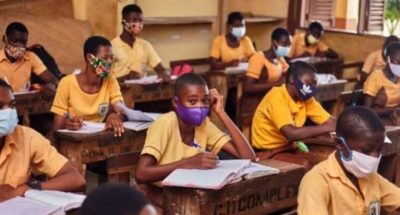Dr Yaw Osei Adutwum, Minister of Education, says private schools in the country will be engaged on the National Standardised Test in 2022 for only

Dr Yaw Osei Adutwum, Minister of Education, says private schools in the country will be engaged on the National Standardised Test in 2022 for only those interested to be enrolled.
He said the Ministry of Education and Ghana Education Service (GES) did not want to ‘force’ private schools into the programme without their consent.
The Minister made these remarks during his visits to examination centres in Accra to observe how the Primary four pupils were faring in the test.
He visited Osu Presbyterian Girls School centre at Osu which had 242 pupils from five schools and Labone Senior High School (SHS) centre which also had 151 pupils from three schools.
There were two absentees recorded at the Labone SHS, a male and a female, whereas, Osu Presbyterian Girls centre recorded no absentee at the time of visit.
The examination started at 11: 45 hours at both centres, with the first part which was Mathematics ending at 13:15 hours. The second part of it which is on English Language will also last for an hour and fifteen minutes.
Dr Adutwum commended the supervisors and invigilators at the centres for ensuring a smooth examination process as well as the pupils for comporting themselves.
He advised the pupils not to be anxious but rather be comfortable and do their best, saying, the test was just to determine how well they were faring in English Language and Mathematics.
The Minister said: “The test was a bold attempt at ensuring that we will know what is happening at schools, thus, how well the pupils are doing in literacy and numeracy which were the foundation of higher studies.”
He explained that it would help the Ministry of Education obtain data for intervention programmes for the pupils to boost their academic performance and help GES plan professional development initiatives for teachers to equip them to teach the pupils.
Dr Adutwum said those who did not excel in the test would be enrolled on special intervention programmes for them to pick up with their colleagues.
“At Primary Five we will do intervention for those who are not doing well and at Primary Six we will test them again to determine if they are doing well or not,” he added.
Madam Monica Ankrah, Greater Accra Regional Director of Education, said in Greater Accra Region there were 48, 745 pupils to participate in the examination.
She said so far they had not recorded any untoward incident at any centre in the region, the only issue was the delay in the start of the test.
She said the late start was caused by delay in getting the examination papers from the West African Examination Council (WAEC) to the various districts.
The test was initially to start at 09:00 hours but was reschedule to 11: 00 hours to 12:15 hours for Mathematics and 12: 45 hours and 12:45 hours to 14: 00 hours for English Language.
In all, 561, 595 Primary Four public school pupils from 15, 911 schools are expected to take part in the test across 2,609 examination centres,with an average of 200 pupils per centre.
COMMENTS